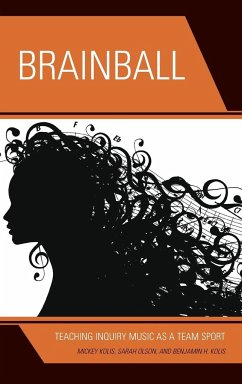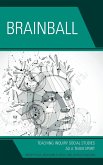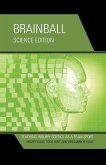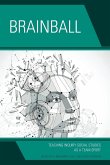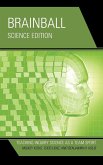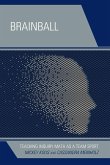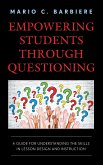- Gebundenes Buch
- Merkliste
- Auf die Merkliste
- Bewerten Bewerten
- Teilen
- Produkt teilen
- Produkterinnerung
- Produkterinnerung
This book attempts to explain why music inquiry makes sense, what pieces are required to do music inquiry effectively (the knowledge, skills and dispositions) and then provides how to teach music inquiry in a series of day-by-day lesson plans.
Andere Kunden interessierten sich auch für
![Brainball Brainball]() Mickey KolisBrainball72,99 €
Mickey KolisBrainball72,99 €![Brainball Brainball]() Mickey KolisBrainball47,99 €
Mickey KolisBrainball47,99 €![Brainball Brainball]() Mickey KolisBrainball38,99 €
Mickey KolisBrainball38,99 €![Brainball Brainball]() Mickey KolisBrainball86,99 €
Mickey KolisBrainball86,99 €![Brainball Brainball]() Mickey KolisBrainball46,99 €
Mickey KolisBrainball46,99 €![The Multi-age Learning Community in Action The Multi-age Learning Community in Action]() Barbara CozzaThe Multi-age Learning Community in Action60,99 €
Barbara CozzaThe Multi-age Learning Community in Action60,99 €![Empowering Students Through Questioning Empowering Students Through Questioning]() Mario C. BarbiereEmpowering Students Through Questioning97,99 €
Mario C. BarbiereEmpowering Students Through Questioning97,99 €-
-
-
This book attempts to explain why music inquiry makes sense, what pieces are required to do music inquiry effectively (the knowledge, skills and dispositions) and then provides how to teach music inquiry in a series of day-by-day lesson plans.
Hinweis: Dieser Artikel kann nur an eine deutsche Lieferadresse ausgeliefert werden.
Hinweis: Dieser Artikel kann nur an eine deutsche Lieferadresse ausgeliefert werden.
Produktdetails
- Produktdetails
- Verlag: Rowman & Littlefield Publishers
- Seitenzahl: 158
- Erscheinungstermin: 15. November 2017
- Englisch
- Abmessung: 235mm x 157mm x 13mm
- Gewicht: 389g
- ISBN-13: 9781475839715
- ISBN-10: 1475839715
- Artikelnr.: 48895779
- Herstellerkennzeichnung
- Libri GmbH
- Europaallee 1
- 36244 Bad Hersfeld
- gpsr@libri.de
- Verlag: Rowman & Littlefield Publishers
- Seitenzahl: 158
- Erscheinungstermin: 15. November 2017
- Englisch
- Abmessung: 235mm x 157mm x 13mm
- Gewicht: 389g
- ISBN-13: 9781475839715
- ISBN-10: 1475839715
- Artikelnr.: 48895779
- Herstellerkennzeichnung
- Libri GmbH
- Europaallee 1
- 36244 Bad Hersfeld
- gpsr@libri.de
Mickey Kolis is the author of six books and a veteran public school teacher; he is currently a university professor. Making learning relevant is his highest professional aspiration. Sarah Olson grew up in Appleton, Wisconsin and attended the University of Wisconsin- Eau Claire. She currently teaches choir at Delong Middle School and serves as the school's behavior interventionist. Benjamin H. Kolis is an actor and theater devisor in Minneapolis, Minnesota.
Foreword Acknowledgements Introduction Section 1: Brainball (Music Edition)
- Why Music Matter Chapter 1: Brainball (Music Edition) - The Point of the
Game is Learning Chapter 2: The Big Ideas: Product, Process, and Community
aligned with Purpose Chapter 3: Brainball (ME) Beliefs (Dispositions)
Chapter 4: Brainball (ME) Key Knowledge Categories Chapter 5: Brainball
(ME) Skills Section 2: Preparing to Coach the Game Chapter 6: Tip 1: Keep
the End-in-Mind Chapter 7: Tip 2: Play the Game Chapter 8: Tip 3:
Competitions as Evaluations Chapter 9: Tip 4: Sequences matter Chapter 10:
Tip 5: Explicit Communications Section 3: Day-to-Day Lesson Plans:
Brainball Illuminated Lesson 1: Observations Lesson 2: Observations Lesson
3: Observations Lesson 4: Observations Lesson 5: Curiosity Lesson 6:
Gathering Information Lesson 7: Gathering Information Lesson 8: Action Plan
- Criteria Day Lesson 9: Skills and Application Lesson 10: Skills and
Application Lesson 11: Skills and Application Lesson 12: Workday Lesson 13:
Workday Lesson 14: Presentations Lesson 15: Presentations Lesson 16: Final
Reflections Conclusion Appendices Appendix A: S.C.A.M.P.E.R. Appendix B:
Making the Most of Observations Appendix C: Stand Up- Hand Up- Pair Up
Morning Meeting Appendix D: Student Outcome Engagement Ideas Appendix E:
Classroom Roles Appendix F: My Brain is Already Full Appendix G: Student
"Teach To..." Appendix: H: Blank Pages Appendix I: Composition Project
Appendix J: How are central concepts used in composition?
- Why Music Matter Chapter 1: Brainball (Music Edition) - The Point of the
Game is Learning Chapter 2: The Big Ideas: Product, Process, and Community
aligned with Purpose Chapter 3: Brainball (ME) Beliefs (Dispositions)
Chapter 4: Brainball (ME) Key Knowledge Categories Chapter 5: Brainball
(ME) Skills Section 2: Preparing to Coach the Game Chapter 6: Tip 1: Keep
the End-in-Mind Chapter 7: Tip 2: Play the Game Chapter 8: Tip 3:
Competitions as Evaluations Chapter 9: Tip 4: Sequences matter Chapter 10:
Tip 5: Explicit Communications Section 3: Day-to-Day Lesson Plans:
Brainball Illuminated Lesson 1: Observations Lesson 2: Observations Lesson
3: Observations Lesson 4: Observations Lesson 5: Curiosity Lesson 6:
Gathering Information Lesson 7: Gathering Information Lesson 8: Action Plan
- Criteria Day Lesson 9: Skills and Application Lesson 10: Skills and
Application Lesson 11: Skills and Application Lesson 12: Workday Lesson 13:
Workday Lesson 14: Presentations Lesson 15: Presentations Lesson 16: Final
Reflections Conclusion Appendices Appendix A: S.C.A.M.P.E.R. Appendix B:
Making the Most of Observations Appendix C: Stand Up- Hand Up- Pair Up
Morning Meeting Appendix D: Student Outcome Engagement Ideas Appendix E:
Classroom Roles Appendix F: My Brain is Already Full Appendix G: Student
"Teach To..." Appendix: H: Blank Pages Appendix I: Composition Project
Appendix J: How are central concepts used in composition?
Foreword Acknowledgements Introduction Section 1: Brainball (Music Edition)
- Why Music Matter Chapter 1: Brainball (Music Edition) - The Point of the
Game is Learning Chapter 2: The Big Ideas: Product, Process, and Community
aligned with Purpose Chapter 3: Brainball (ME) Beliefs (Dispositions)
Chapter 4: Brainball (ME) Key Knowledge Categories Chapter 5: Brainball
(ME) Skills Section 2: Preparing to Coach the Game Chapter 6: Tip 1: Keep
the End-in-Mind Chapter 7: Tip 2: Play the Game Chapter 8: Tip 3:
Competitions as Evaluations Chapter 9: Tip 4: Sequences matter Chapter 10:
Tip 5: Explicit Communications Section 3: Day-to-Day Lesson Plans:
Brainball Illuminated Lesson 1: Observations Lesson 2: Observations Lesson
3: Observations Lesson 4: Observations Lesson 5: Curiosity Lesson 6:
Gathering Information Lesson 7: Gathering Information Lesson 8: Action Plan
- Criteria Day Lesson 9: Skills and Application Lesson 10: Skills and
Application Lesson 11: Skills and Application Lesson 12: Workday Lesson 13:
Workday Lesson 14: Presentations Lesson 15: Presentations Lesson 16: Final
Reflections Conclusion Appendices Appendix A: S.C.A.M.P.E.R. Appendix B:
Making the Most of Observations Appendix C: Stand Up- Hand Up- Pair Up
Morning Meeting Appendix D: Student Outcome Engagement Ideas Appendix E:
Classroom Roles Appendix F: My Brain is Already Full Appendix G: Student
"Teach To..." Appendix: H: Blank Pages Appendix I: Composition Project
Appendix J: How are central concepts used in composition?
- Why Music Matter Chapter 1: Brainball (Music Edition) - The Point of the
Game is Learning Chapter 2: The Big Ideas: Product, Process, and Community
aligned with Purpose Chapter 3: Brainball (ME) Beliefs (Dispositions)
Chapter 4: Brainball (ME) Key Knowledge Categories Chapter 5: Brainball
(ME) Skills Section 2: Preparing to Coach the Game Chapter 6: Tip 1: Keep
the End-in-Mind Chapter 7: Tip 2: Play the Game Chapter 8: Tip 3:
Competitions as Evaluations Chapter 9: Tip 4: Sequences matter Chapter 10:
Tip 5: Explicit Communications Section 3: Day-to-Day Lesson Plans:
Brainball Illuminated Lesson 1: Observations Lesson 2: Observations Lesson
3: Observations Lesson 4: Observations Lesson 5: Curiosity Lesson 6:
Gathering Information Lesson 7: Gathering Information Lesson 8: Action Plan
- Criteria Day Lesson 9: Skills and Application Lesson 10: Skills and
Application Lesson 11: Skills and Application Lesson 12: Workday Lesson 13:
Workday Lesson 14: Presentations Lesson 15: Presentations Lesson 16: Final
Reflections Conclusion Appendices Appendix A: S.C.A.M.P.E.R. Appendix B:
Making the Most of Observations Appendix C: Stand Up- Hand Up- Pair Up
Morning Meeting Appendix D: Student Outcome Engagement Ideas Appendix E:
Classroom Roles Appendix F: My Brain is Already Full Appendix G: Student
"Teach To..." Appendix: H: Blank Pages Appendix I: Composition Project
Appendix J: How are central concepts used in composition?

